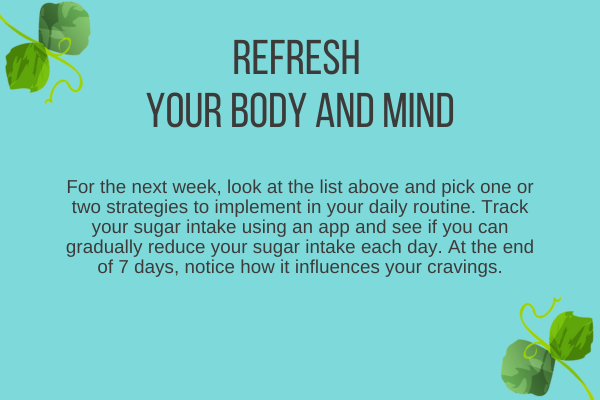Today, let’s address a common challenge that many of us face—sugar addiction. I’m a firm believer that moderation is key. The problem is that as a society, we’re seriously addicted to this little white powder and it’s in virtually everything that comes in a packet from the store. In the US, we even put sugar in our pasta sauce!
So while a little sugar here and there might not harm anyone, an addiction to it can cause lasting issues – headaches, lethargy, sensitivities, inflammation, all of which lead to disease.
My goal is to help you to start to break free from its grip.
Here are effective strategies to overcome sugar addiction:
1. Gradual Reduction:
Rather than going cold turkey, gradually reduce your sugar intake. This can make the process more manageable and sustainable. For example, sub out a sugary breakfast cereal for some protein you enjoy, like some scrambled eggs with smoked salmon. An excellent way to track your sugar intake is the My Fitness Pal app – that way, you can see where you’re currently at and you can see your progress with sugar reduction. https://www.myfitnesspal.com/
2. Identify Hidden Sugars:
Learn to identify hidden sugars in processed foods by checking ingredient lists. Be aware of alternative names for sugar, such as sucrose, high fructose corn syrup, and agave. An example of this… let’s say you’re going to buy cold cuts at the store. Many people think that if they order turkey, they’re getting, well, turkey and maybe salt. But what’s in that particular turkey product can vary by label. One might contain turkey and salt whereas another may contain a list of 10-15 ingredients, including sugar. And when you use ketchup, it could be assumed that it’s just liquid tomatoes – but check to see if there’s added sugar. There are lots of tasty versions without sugar!
3. Opt for Whole Foods:
Choose whole, unprocessed foods that are naturally sweet, like fruit. Yes, they contain a form of sugar, but they also contain fiber and nutrients, and they provide healthy microbes which contribute to a happy and healthy microbiome, providing sweetness in a healthier package with health benefits to go with it.
4. Balanced Meals:
Consume balanced meals with a mix of protein, healthy fats, and complex carbohydrates to maintain stable blood sugar levels and reduce sugar cravings. Divide your plate in to 3 – half should be veggies, 1/4 protein and 1/4 carb. Rather than building your meals with carbs as the foundation, have the veggies be your foundation and work from there.
5. Stay Hydrated:
Dehydration can sometimes be mistaken for hunger, leading to unnecessary sugar cravings. Stay well-hydrated throughout the day with water and avoid sugary drinks.
6. Mindful Eating:
Pay attention to your body’s hunger and fullness cues. Eat mindfully, savoring each bite, and be present during meals. Ask yourself, am I truly hungry or is it a sugar craving? If it’s true hunger, you’d be willing to eat a tasty protein, nuts, seeds, fruits and vegetables. But if your mind simply doesn’t want any of those foods in that moment and just “needs” a candy bar, it’s possible it’s a sugar craving, not hunger.
7. Substitute Smartly:
If you do identify that it’s a sweet craving and that you realllllyyyy need to have something sweet, challenge yourself to healthier alternatives like fresh fruit or a small piece of dark chocolate. I get it – sometimes only ice cream will do the trick, but have that be something you give in to occasionally, not daily.
8. Support System:
Do you have a friend who also struggles with sugar? Share what you’re doing. Having a support system can provide encouragement and accountability.

I’d love for you to share your experiences, favorite strategies, or any questions by commenting below – I’d love to hear about your journey to breaking free from sugar addiction!

